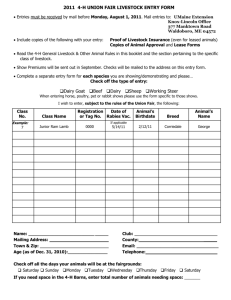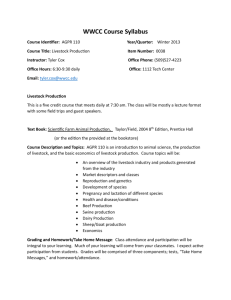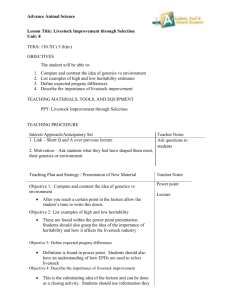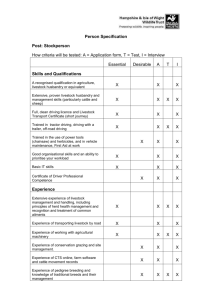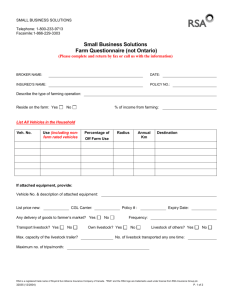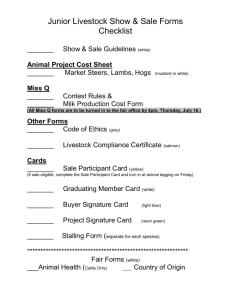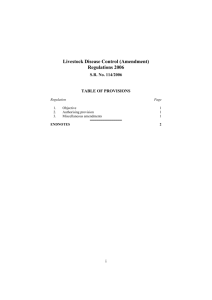MURRAY STATE UNIVERSITY
advertisement
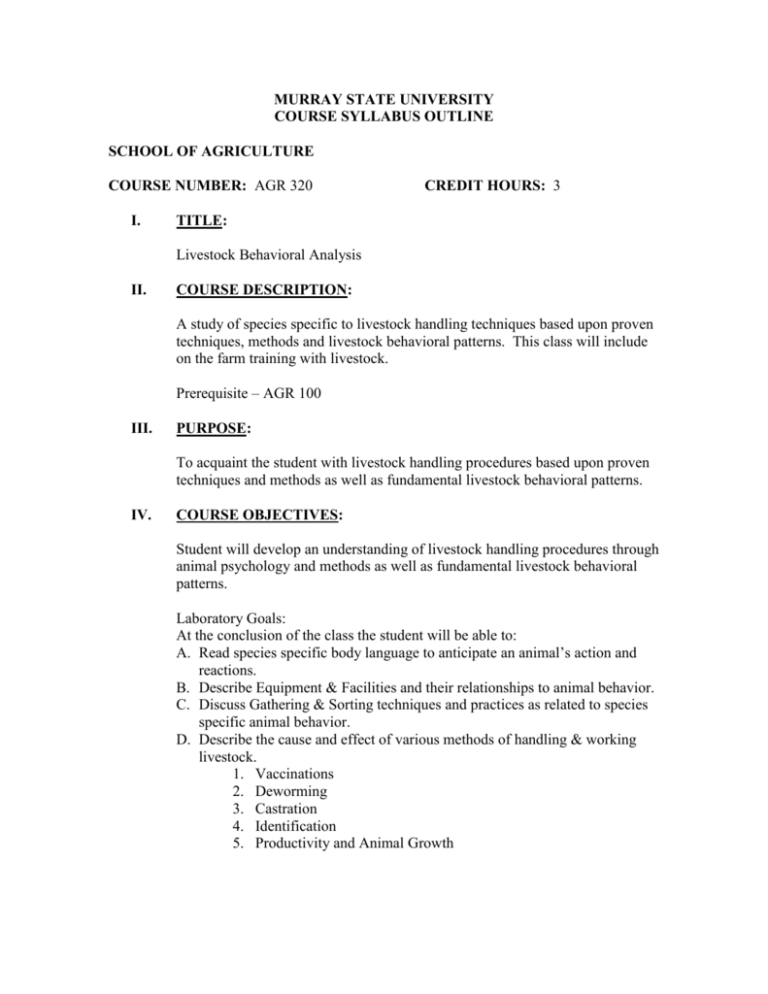
MURRAY STATE UNIVERSITY COURSE SYLLABUS OUTLINE SCHOOL OF AGRICULTURE COURSE NUMBER: AGR 320 I. CREDIT HOURS: 3 TITLE: Livestock Behavioral Analysis II. COURSE DESCRIPTION: A study of species specific to livestock handling techniques based upon proven techniques, methods and livestock behavioral patterns. This class will include on the farm training with livestock. Prerequisite – AGR 100 III. PURPOSE: To acquaint the student with livestock handling procedures based upon proven techniques and methods as well as fundamental livestock behavioral patterns. IV. COURSE OBJECTIVES: Student will develop an understanding of livestock handling procedures through animal psychology and methods as well as fundamental livestock behavioral patterns. Laboratory Goals: At the conclusion of the class the student will be able to: A. Read species specific body language to anticipate an animal’s action and reactions. B. Describe Equipment & Facilities and their relationships to animal behavior. C. Discuss Gathering & Sorting techniques and practices as related to species specific animal behavior. D. Describe the cause and effect of various methods of handling & working livestock. 1. Vaccinations 2. Deworming 3. Castration 4. Identification 5. Productivity and Animal Growth V. CONTENT OUTLINE: A. Bovine (beef cattle & dairy cattle) B. Porcine C. Equine D. Ovine (sheep and goats) E. Aquatic (fish and shrimp) VI. INSTRUCTIONAL ACTIVITIES: A. B. C. D. VII. Lecture demonstration Class exercises with livestock Hands on training Homework assignments FIELD, CLINICAL, AND/OR LABORATORY EXPERIENCES: Lab and informational trips to University Farm and area production facilities. VIII. RESOURCES: A. B. C. D. IX. Farm Laboratories Guest Lecturers Video Training Use of Internet GRADING PROCEDURES: A. Letter grades A = 90 – 100 B = 80 – 89 C = 70 – 79 D = 60 – 69 E = Below 60 B. Exams: Lecture (2/3) 3 – 1 hour exams 1 – final exam Lab (1/3) Homework Lab exams 300 points 100 points 100 points 100 points Total 600 points C. Make-up exams and homework will be permitted with a reasonable excuse for the absence. All make-up work must be completed prior to exam week. X. ATTENDANCE POLICY: Please refer to the most current copy of the Murray State University’s Undergraduate Bulletin. XI. ACADEMIC HONESTY POLICY: (Adopted by the MSU Board of Regents) Cheating, plagiarism (submitting another person’s material as one’s own), or doing work for another person which will receive academic credit are all impermissible. This includes the use of unauthorized books, notebooks, or other sources in order to secure or give help during an examination, the unauthorized copying of examinations, assignments, reports, term papers, or the presentation on unacknowledged material as if it were the student’s own work. Disciplinary action may be taken beyond the academic discipline administered by the faculty member who teaches the course in which the cheating took place. NOTE: The School of Agriculture Faculty have adopted and implemented an Academic Honesty Policy in addition to the University Honesty Policy, which can be found in the current Undergraduate Bulletin. The policy sets guidelines regarding acts of dishonesty and the procedure to follow should an event occur. It is each Agriculture student’s responsibility to obtain and read a copy of this document. The School’s Academic Honesty Policy can be obtained by asking for a copy from any Agriculture Faculty member or the Secretary. XII. TEXT AND REFERENCES: No text required. XIII. PREREQUISITES: AGR 100 XIV. NON-DISCRIMATION POLICY STATEMENT: Murray State University endorses the intent of all federal and state laws created to prohibit discrimination. Murray State University does not discriminate on the basis of race, color, national origin, gender, sexual orientation, religion, age, veteran status, or disability in employment, admissions, or the provision of services and provides, upon request, reasonable accommodation including auxiliary aids and services necessary to afford individuals with disabilities equal access to participate in all programs and activities. For more information, contact Director of Equal Opportunity, 103 Wells Hall. 270-809-3155 (voice), 270-809-3361 (TDD). XV. MSU SCHOOL OF AGRICULTURE CELL PHONE POLICY The School of Agriculture recognizes that in today’s world cell phones are a familiar and often necessary form of communication for students. It shall be the policy of the School that no cell phone usage shall be allowed in class and/or labs without the prior consent of the course instructor. This shall include verbal calling, incoming calls, email, text messaging, and use of cell phone calculators on tests and quizzes. Cell phones must be kept off and out of sight (i.e. secured to a person’s belt or kept in a bag or purse away from desks and lab counters). Should a student’s cell phone be visible, ring, or other form of unauthorized usage that is interruptive to the class or lab, the student may be asked to leave class and not return for that class/lab period. Upon prior consent of the instructor, a student may obtain permission to have their phone on in case of an emergency or in critical family situations. This policy also includes pagers and other electronic equipment such as blackberries and/or computers/laptops.
